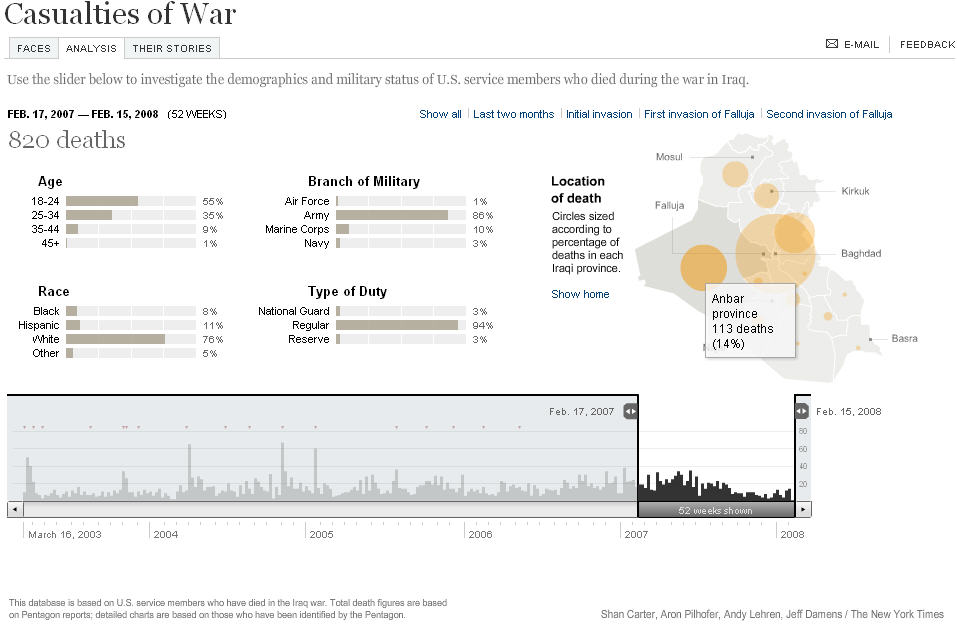 Originally posted at American Thinker.
Originally posted at American Thinker.
During the Iraq War and when the New York Times was actively campaigning for Barack Obama, Grey Lady readers were subjected to a military service obituary entitled Faces of the Dead. Daily, readers were forced to “face” the grim reality that young American soldiers were prematurely dying in Iraq. The content of the site focused on poignant stories juxtaposed against the backdrop of what liberals argued was an unjust war.
Every day readers were confronted with demographics, photographs and related links like, 2,000 Dead: As Iraq Tours Stretch On, a Grim Mark (October 26, 2005) and U.S. Death Toll in Iraq War Hits 4,000 (March 24, 2008). In addition, the NY Times online included a photo diary containing excerpts from e-mails and journals of six soldiers who died in Iraq
In May of 2009, around the same time Obama decided a troop surge was necessary in Afghanistan, the NY Times death inventory came to an abrupt halt. To date, eight-months after the first major wave of new troops were ordered by Barack Obama into Afghanistan, Casualties of War has not been up-dated to include Afghan surge fatalities. Military victims of Obama’s Afghan war are missing from the Faces of the Dead section, which throughout Bush’s Iraqi war effort was refreshed on a daily basis.
The NY Times said the following about Casualties of War,
“However you feel about the war, this graphic presents facts and allows the viewer to develop their own impressions and opinions rather than packaging the same information with any sort of bias.”
So, in the spirit of unbiased journalism, it’s time the NY Times extended the present administration an equally impressive detailed register of soldiers dying under Commander-in-Chief’s Obama’s war watch.
In the last eight months 600 dead has grown to nearly a thousand. If pertinent “facts” allow website viewers “to develop their own impressions and opinions,” which was the supposed purpose of Casualties of War, then the NY Times has an opportunity to actively reengage the public in forming independent opinion by monitoring and reporting in an interactive way the sharp increase in statistical military death related data.
For instance, readers may be interested to know that the seven years and four months preceding Obama’s eight-month surge, seven deaths per month took place. However, in eight months those figures grew to almost 39 deaths per month, which corresponds to a 450% increase in military lives lost.
Robert Gibbs contends, “We never have a plan to transfer anybody either to a home country or to a third country that we have reason to believe will present a security situation for us or for that country.” Thus, the NY Times could also include a groundbreaking addition to the presentation called The Adventures of Released Enemy Combatants. Maybe the website can dedicate a specific section to soldiers who would otherwise be alive today if not for a fatal meeting with insurgents released from the prison Obama wants permanently closed.
The uptick in war related Obama troop surge fatalities could provide the NY Times lots of vignette fodder, as well as many more photos of the president saluting flag draped coffins in the middle of the night. If the New York Times decides to chronicle the current combat obituary, if the last eight months are any indication of what’s ahead, The Obama Years: Casualties of War has the potential to be even more damaging to Obama’s presidency than the NY Times 7-year narrative on Bush in Iraq.

